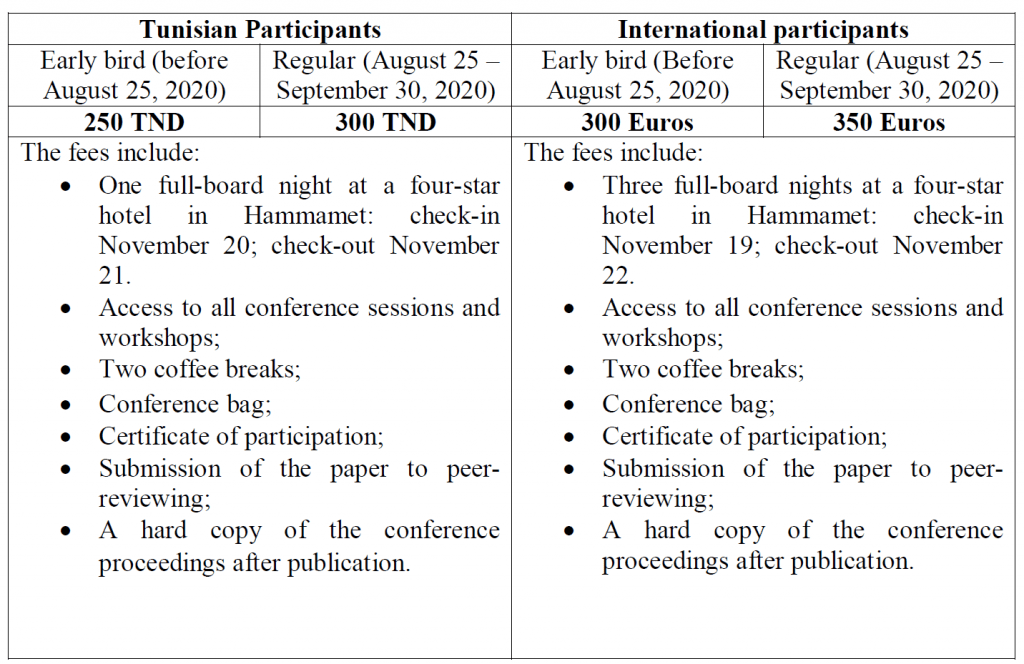TAELS organizes its 6th International Conference on:
“Metaphors of Marginality and Otherness”
20-21 November 2020
Venue: Hammamet – Tunisia
The deadline to submit proposals is June 30th, 2020.
The term “marginal” finds roots in the Medieval Latin word “marginalis”, which means on the margin or situated on the border or edge. First introduced by sociologist Robert Park in 1928, the concept was used to describe human migrants and shed light on the singularity of their situation as social beings removed from the center.
In a broader context, marginality not only describes the precarious position of disadvantaged groups systematically excluded from the social, cultural, political and economic spheres, but also helps construct and imagine the margins in their daily struggle. Marginality has long engrossed established scholars and researchers from different academic circles and pushed them to investigate its multiple facets.
Marginality touches upon the question of identity and human consciousness. The processes of self-identification and identification are tightly related to a dichotomous perception of the ‘Self’ and the ‘Other’. In fact, self-awareness is organically related to the construction of ‘Otherness’ because the representation of the ‘Other’ is a determining component of the perception and definition of the self. These processes could also imply a complex system of devaluation of human groups identified as marginal. Obviously, the convergence of the ‘Self’ and the ‘Other’ has most of the time elicited discourses of marginality centering on the proliferation of stereotypes, prejudices, and ethical issues in different research areas affecting thus identity construction.
The social construction of gender is a relevant example of how many societies shape identity, social status and social categories according to binary opposites. Gender relations are not natural. They do represent a hierarchy imposed on biological differences and thus showing the bias of power relationships between men and women. In her discussion of the issue of otherness, Simone de Beauvoir insisted on the hierarchical division of human beings. “The subject can be posed only in being opposed – he sets himself up as the essential, as opposed to the other, the inessential, the object”. Accordingly, de Beauvoir argues that woman is the opposite (other) of man who “defines woman not in herself but as relative to him […] she is the incidental, the inessential as opposed to the essential. He is the Subject, he is the Absolute – she is the Other” (The Second Sex).
The literary study of marginality and otherness is also an occasion for established scholars and researchers to explore the convergences of imagination and expression of a number of writers who succeeded in challenging the question of canonicity. The reading of Afro-American texts, for instance, is a comparative perspective to explore and update one’s own understanding of the grounds of the canon. The movement against the will of the dominant culture is definitely essential in empowering marginalized discourses which often remained silenced by the same dominant culture.
In the critical-discourse tradition, the focus on marginality fueled the debate on identity and representations of the other. It brought more interest in relations of power in society and the themes of discrimination, marginalization, and exclusion in different types of discourses. The emerging research paradigms have offered new instruments and tools for a deeper investigation of the representations of the margins and the other. This relatively new research tradition has disturbed many old views on power relations between different types of human groups.
The human-rights tradition has also given voice to groups that have been marginalized across history. Gender studies and research on all types of minorities have entailed more interest in the voices that have historically been in the margins. This trend has advocated a more equal representation of the “different other” and triggered a wide sense of empathy for all types of communities and groups that do not fit into the “dominant norm”.
The tremendous developments in artistic creation in the last few decades have also devoted space to voices that have never been in the loop. The emerging artistic forms in music, cinema, drama, and many other forms of human creativity, have given prominence to otherness and human differences across the globe. These emerging artistic expressions have profited enormously from the recent technological developments that have erased many of the boundaries between different types of communities and social groups.
It is within this framework that the steering committee welcomes individual and panel proposals related, but not limited, to the following topics:
- Marginality and marginalization
- Representations of marginality
- Representations of the Other
- Marginality in literature
- Discourses on Marginality
- Voices from the margins
- Marginality in history
- Marginality in the social sciences
- Arts on Marginality
- Marginality and human rights
- Marginality in the media
- The sociolinguistics of marginality
- Metaphors of the Other
- Stereotyping and stigmatization
- Identity and (In)visibility
- Minor/Major (canonical) texts
Submission
We welcome individual abstracts for 20-minute presentations and complete panel proposals of three or four papers treating a similar theme or topic. Priority will be given to panel proposals.
Participants are kindly invited to submit their proposals via one of these links:
The deadline to submit proposals is June 30th, 2020. Notifications of acceptance will be communicated by July 10th, 2020.
TAELS editorial board will select a number of papers that will be published after peer-reviewing in a collective volume on the proceedings of the conference.
Registration
We offer the following packages to presenters of accepted abstracts:

For attendance only, the packages are as follows:

Payment Modes
- Option 1: Bank transfer
Bank account details
IBAN: TN 59 1070 5007 0481 8407 8872
Bank address: Rue Hédi Nouira – 1001 Tunis – Tunisia
Swift code: STBKTNTT
TAELS Address: ISLG, Rue Ali Jmel, 6000, Gabes– Tunisia
- Option 2: Western Union transfer
Recipient: Abdelhamid Rhaiem, TAELS treasurer
ISLG, Rue Ali Jemel, Gabes 6000 Tunisia
For advice and more details about transportation, please send your requests to saidiezz@gmail.com. TAELS team will be happy to assist in making your stay most comfortable.
